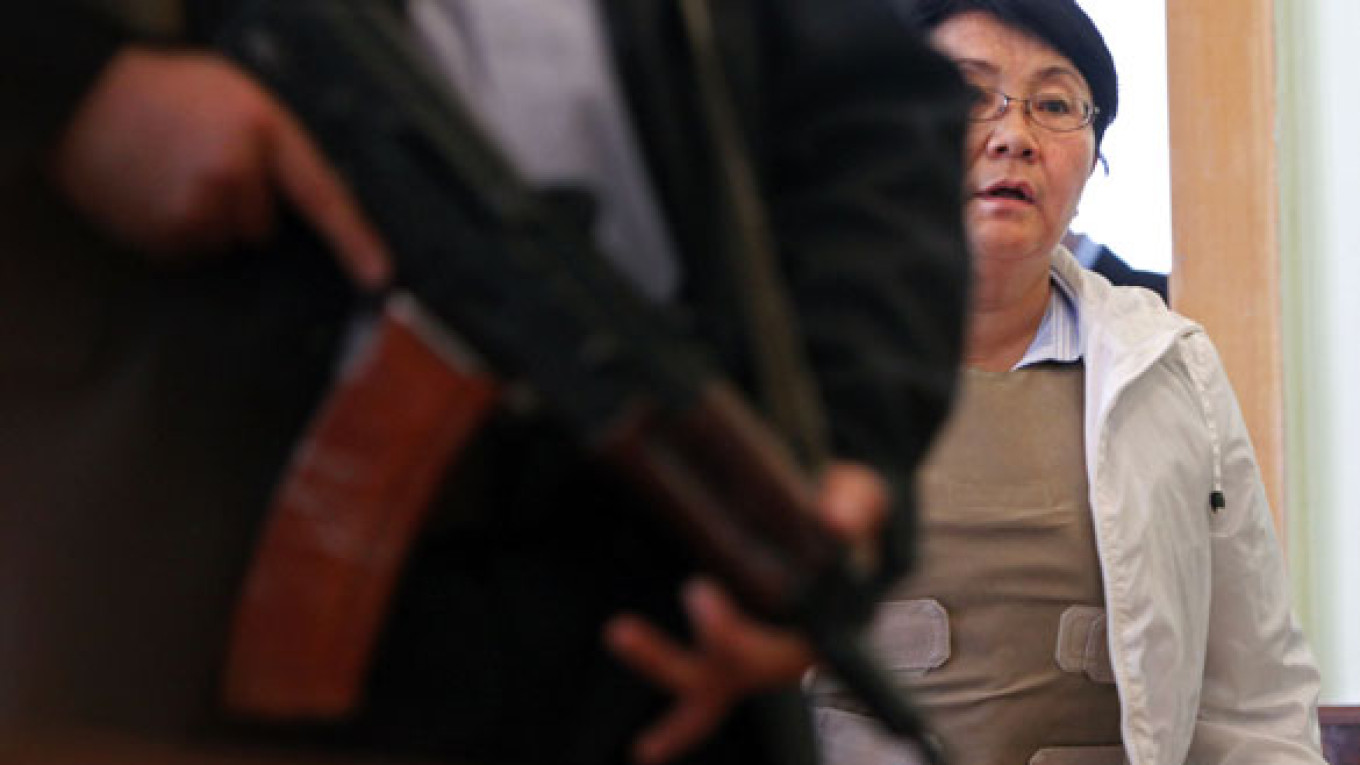OSH, Kyrgyzstan — Kyrgyzstan's interim leader traveled to the strife-torn south on Friday, pledging to rebuild the region to allow refugees from ethnic bloodletting to return to their homes from squalid camps.
The government has struggled to restore order following clashes between Uzbeks and Kyrgyz around the ancient Silk Road city of Osh that killed about 200 people last week — the worst violence in Kyrgyzstan in two decades.
Hundreds of thousands of refugees, mainly women and children, are crammed into huts and makeshift camps in the sun-scorched plains of the Ferghana valley, many running out of food and water.
Acting president Roza Otunbayeva landed in Osh, its streets lined with charred buildings, in a military helicopter to meet local leaders.
"We will rebuild the city of Osh no matter what, so people can return to their homes," a government statement quoted Otunbayeva as saying during the visit.
The former Soviet republic has been rocked by unrest since a revolt in April toppled its president Kurmanbek Bakiyev and brought the interim government to power.
Some 400,000 people out of Kyrgyzstan's population of only 5.3 million have fled since June 10, some to refugee camps in neighboring Uzbekistan.
U.S. Assistant Secretary of State Robert Blake flew to inspect refugee camps on the Uzbek side of the border where a stable security situation has allowed the authorities to set up more orderly camps to house about 100,000 people.
In one camp, lined with rows of tents marked with the United Nations logo, dozens of women, many in tears, surrounded Blake, who was later expected to fly to Kyrgyzstan.
"It is important to establish peace for your safe return," he told them through an interpreter. "An investigation should be carried out to prevent this in the future."
Otunbayeva, whose government has not been formally elected, has accused Bakiyev of organizing gangs of armed men to shoot at both Uzbeks and Kyrgyz to ignite ethnic violence in the south, Bakiyev's traditional stronghold.
Both ethnic groups have suffered in the violence but witnesses say losses on the Uzbek side are considerably greater.
In the city of Osh, its streets strewn with rubble and still echoing with occasional gunfire, Uzbek neighborhoods have set up barricades separating them from Kyrgyz areas.
Sporadic attacks have continued but major violence has subsided since Monday. Some locals started venturing out of their homes to pick through the wreckage.
"Osh residents are in urgent need of protection and humanitarian assistance," Human Rights Watch said.
"The tense security situation, barricades, and checkpoints have significantly limited distribution of aid, medical supplies, and access to medical treatment."
The government is keen to stick to its plan to hold a constitutional referendum on June 27.
The ethnic breakdown of the official death toll of more than 190 people is not clear and the government has said the real death toll could be several times higher. In an interview with Russia's Kommersant daily published on Friday, Otunbayeva said it could be as high as 2,000.
Some 2,000 have been injured, according to official figures.
The United States and Russia are worried that continued turmoil in Kyrgyzstan, which lies on a major drug trafficking route out of nearby Afghanistan, would offer a breeding ground for Islamist militancy in Central Asia.
Russian President Dmitry Medvedev, interviewed by the Wall Street Journal, warned that Islamist extremists could grab power.
"When people lose faith in the ability of the civil authorities to bring law and order and decide there is only one force that can do it, then we can end up with a Kyrgyzstan that would develop along the Afghan scenario, the Afghan scenario of the Taliban period," he said.
"And that, I think, would be very sad indeed, and highly dangerous for our country and for other countries in Central Asia."
A Message from The Moscow Times:
Dear readers,
We are facing unprecedented challenges. Russia's Prosecutor General's Office has designated The Moscow Times as an "undesirable" organization, criminalizing our work and putting our staff at risk of prosecution. This follows our earlier unjust labeling as a "foreign agent."
These actions are direct attempts to silence independent journalism in Russia. The authorities claim our work "discredits the decisions of the Russian leadership." We see things differently: we strive to provide accurate, unbiased reporting on Russia.
We, the journalists of The Moscow Times, refuse to be silenced. But to continue our work, we need your help.
Your support, no matter how small, makes a world of difference. If you can, please support us monthly starting from just $2. It's quick to set up, and every contribution makes a significant impact.
By supporting The Moscow Times, you're defending open, independent journalism in the face of repression. Thank you for standing with us.
Remind me later.


